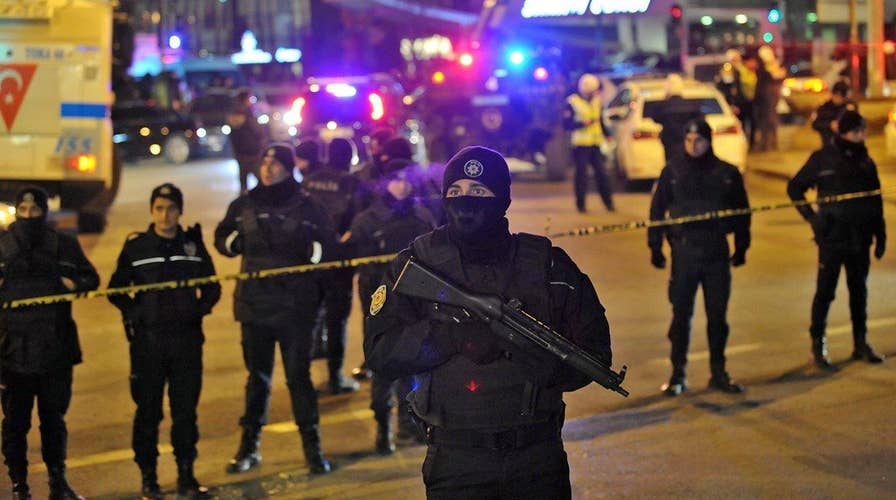What is the US doing to combat terrorism in Turkey?
Bias Bash: Ellen Ratner on how the media is reporting the dangers of traveling to Turkey but not on what the US is doing to assist the Turkish government in combatting terrorism
ANKARA, Turkey – Turkey's president on Wednesday implicated a U.S.-based Muslim cleric in the killing of Russia's envoy to Turkey, saying the policeman who carried out the attack was a member of his "terror organization."
Ambassador Andrei Karlov was killed Monday evening by a gunman in front of stunned onlookers at a photo exhibition in Ankara. The assassin, Mevlut Mert Altintas of Ankara's riot police squad, was killed in a police operation.
"He (Altintas) was a member of the FETO terrorist organization. There is no point in hiding this," President Recep Tayyip Erdogan said during a joint news conference with his visiting Albanian counterpart. "From the places he was raised to his connections — that's what they point at."
Turkey has accused Fethullah Gulen — a former ally who has turned into Erdogan's top foe — of trying to destabilize Turkey and says his movement is behind a failed military coup in July aimed at toppling the Turkish leader. Gulen has denied any involvement in the coup. His movement also condemned "in the strongest terms" the ambassador's assassination.
The government however, has labeled the movement "the FETO terror organization" and has cracked down on Gulen's followers, arresting tens of thousands of people for their alleged link to the coup and purging more than 100,000 suspected supporters from government jobs.
Turkey is also pressing the United States to extradite Gulen so he may be prosecuted for the coup attempt and other alleged crimes.
Erdogan told reporters that Turkey's intelligence agency was also looking into Altintas' possible foreign connections, saying there were "certain clues" indicating overseas links. He did not elaborate.
Turkey has been rife with speculation about Altintas' motive and possible links to Gulen, but Erdogan's statement was the first time a senior official openly blamed the killing on the movement.
On Tuesday evening, Turkish Foreign Minister Mevlut Cavusoglu spoke with U.S. Secretary of State John Kerry by phone and provided information on the assailant, according to an official in his ministry. The official, speaking on condition of anonymity in line with government rules, said Cavusoglu also told Kerry that both Turkey and Russia "know" that Gulen's movement was behind the attack.
During the phone call, Kerry raised concerns about "some of the rhetoric coming out of Turkey with respect to American involvement or support, tacit or otherwise, for this unspeakable assassination yesterday because of the presence of Mr. Gulen here in the United States," Kerry's spokesman John Kirby said.
"It's a ludicrous claim, absolutely false," Kirby said. "We need to let the investigators do their job and we need to let the facts and the evidence take them where it is before we jump to conclusions."
Russia flew a team of 18 investigators and foreign ministry officials to Turkey to participate in the investigation. In Moscow, President Vladimir Putin's spokesman indicated that Russia doesn't believe the 22-year-old gunman acted on his own, but refused to explain the reasons for the suspicion.
"We shouldn't rush with any theories before the investigators establish who were behind the assassination of our ambassador," spokesman Dmitry Peskov said Wednesday.
Neighbors in Altintas' hometown of Soke in western Turkey near the Aegean coast described a quiet, respectable family who showed no signs of radicalization.
"To me, he appeared to be a well-meaning, calm fellow. That's how I saw him. His mother and father are good people," said neighbor Zeki Inan, 74. "We were shocked when we heard that this boy did this. We could not believe it."
Turkey's state-run Anadolu Agency raised the number of people detained in connection to the attack to 11, including Altintas' parents, sister, three other relatives and his roommate.
The agency said investigators, among other things, were trying to determine whether anyone from the Russian Embassy may have provided the gunman with information about Karlov as well as the gunman's links to possible Gulenists within Turkey's police force.
Citing the Ankara prosecutor's office, Anadolu said the gunman, who had three spare cartridges on him as well as more than 20 bullets in his pocket, ignored calls for him to surrender after he had shot the ambassador, and opened fire on police, taking shelter behind a wall. It said special forces police who stormed the art gallery shot Altintas in the feet, legs and knees but that he continued to fire on police from the ground, shouting that he "would not be captured alive."
The report said investigators believe the security forces killed Altintas, fearing he may have had a bomb on him.
Deputy Prime Minister Numan Kurtulmus, speaking to Turkish state television TRT, also said the gunman is not believed to have acted alone.
"This is not an ordinary attack that was conducted by a lone man," Kurtulmus said. "There are some people who directed (him) behind the scenes, who led him into carry out such a plan, who wanted to obtain political gains."
"Those who are behind this pawn wanted to disrupt ...Turkish-Russian relations in an irreparable way. But they won't succeed," he said.









































